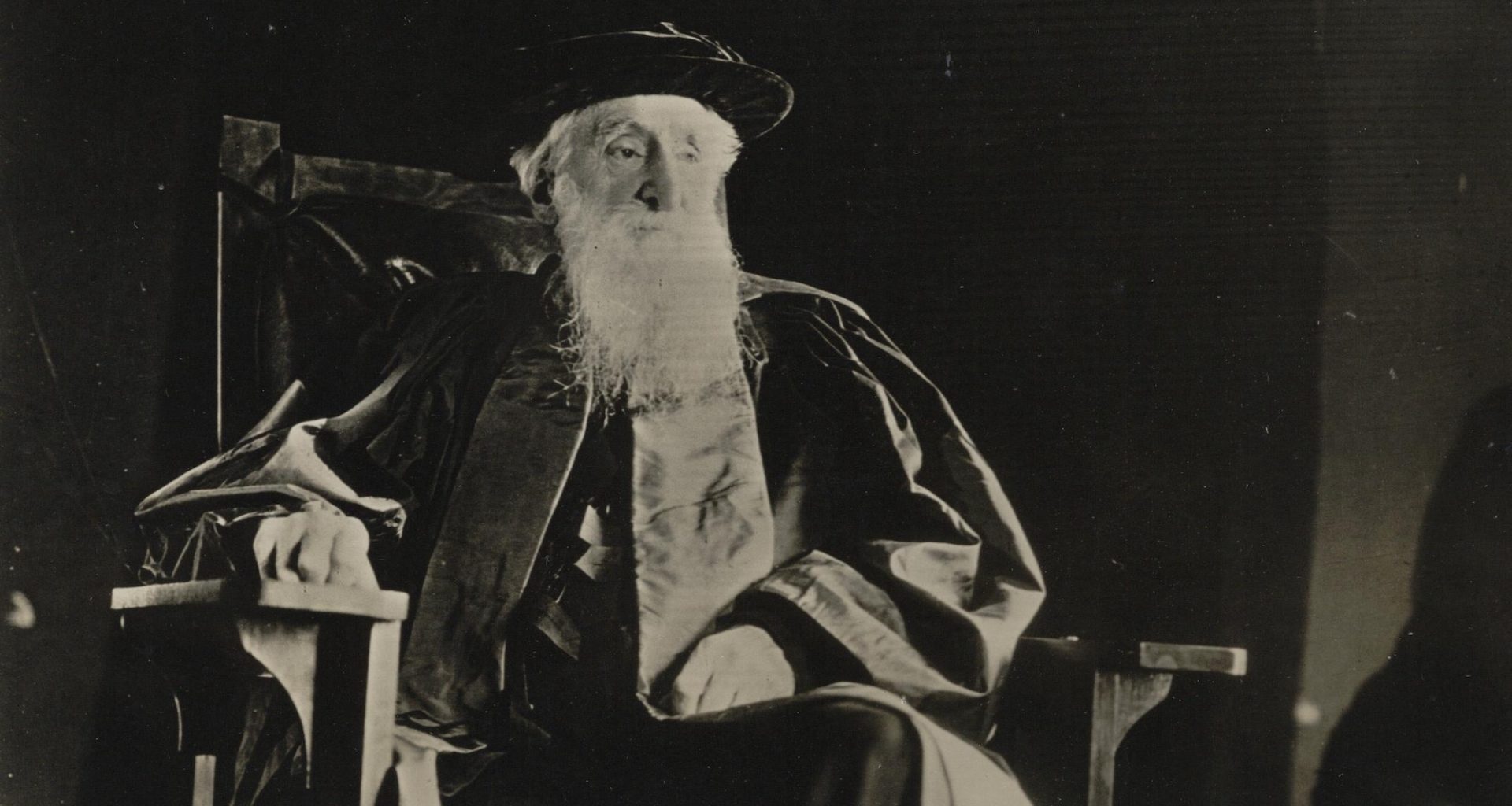Has the definition of a good life changed since Booth’s time?
During his sermons, William Booth, the founder of The Salvation Army, often asked listeners: “What are you living for?”
He had given “the good life” a lot of thought.
For Booth, the answer had little to do with comfort or success and everything to do with purpose, sacrifice and love.
Booth had a vision for a life well-lived, one that wasn’t about escaping hardship but engaging with it. And while he lived in the 19th century, his convictions still speak to a world wrestling with inequality, injustice and isolation.
“What is the secret purpose that controls and fashions your existence?” Booth asked in an 1885 sermon. “Is it the salvation of souls, the overthrow of the kingdom of evil and the setting up of the kingdom of God? … If I know my own heart, it is full of yearning for the happiness of all [people].”
Today, The Salvation Army still aims to instill hope in people, meeting essential needs and guiding them to “the good life” centered in Christ. Here are five principles—drawn from Booth’s words and actions—that point toward what he might have called a life well-lived.
1. Live for others
Booth, along with his wife and partner in ministry, Catherine Booth, shared a unified message: Our lives are not our own, and true purpose is found in service to others.
“Put your ear down to the Bible and hear the call to rescue the perishing. Put your ear down to the burdened and the broken and hear their cry,” Booth wrote in a 1907 letter.
For Booth, the good life begins when we stop asking, “What do I want?” and start asking, “Whom can I help?” His life’s work was built around the idea that we exist to serve—especially the poor, the lost and the marginalized.
That calling still resonates today.
“If William Booth were alive today, I believe his keys to living ‘the good life’ would include living for others,” said Divisional Secretary for San Diego County Major Rob Reardon. “Insomuch as we are able to live the good life, it is dependent on what we are doing to make life good for those around us.”
Reardon recalled a telegram Booth sent in 1910, to inspire his troops. It contained a single word: “OTHERS.” That word still serves as a call to lift up the people around us and, as Philippians 2:3–4 reminds us, to value others above ourselves. In fact, one of The Salvation Army’s highest civic honors bears the name “Others Award.”
At the Jan. 23 National Advisory Board meeting held at the Hilton Lake Las Vegas Resort in Henderson, Nevada, Elise Noorda was honored with the Others Award for her service at The Salvation Army Owens Campus in Las Vegas, benefiting The Salvation Army and the community.
2. Do something
What are we doing for others?
For Booth, the good life wasn’t theoretical. It was hands-on. He believed that love demands action.
The Salvation Army’s mission—to preach the gospel of Jesus Christ and meet human needs in his name without discrimination—requires more than just showing up for church.
“I think Booth would say, ‘The world is filled with social ills that require us to address them,’” said College for Officer Training at Crestmont Training Principal Dr. Major Terry Masango. “The good life is doing something to relieve the pain of the lonely senior in a nursing home, the young person caught in addiction, the family weighed down by poverty.”
“Let’s not sit on our laurels,” Masango continued. “The good life is not passive—it is a life of immediate, decisive action for righteousness and justice.”
That spirit of action is alive today, often in creative ways. In one recent initiative, the Adult Rehabilitation Centers (ARCs) Command Donation Development Team partnered with SeaWorld, Otis College of Art and Design, and Santa Monica College to address both textile waste—annually a 17-million-ton issue—and marine pollution.
Unsold clothing donations—items that would otherwise end up in landfills or contribute to ocean waste—were transformed into art by student designers, raising awareness while giving new purpose to discarded materials.
3. Keep the fire burning
In a letter to his son Bramwell in 1879, William Booth warned, “The tendency of fire is to go out; watch the fire on the altar of your heart.” For Booth, faith was never meant to be passive. He called it “the fire”—that inner flame of compassion and holy urgency that fuels a life of action.
Whatever your calling is, Booth would ask: Are you all in?
That same fire burns in Salvation Army leaders today. In 2023, the Ridgecrest (California) Corps sent a teen who was in the foster care system to Camp Redwood Glen. But the story didn’t end after camp. The corps officer (pastor) who helped her get there stayed connected—offering mentorship, encouragement and spiritual support long after summer ended. Through regular communication and outings, the teen found a steady source of guidance and care, which kept the spirit sparked at camp going.
4. Stay close to God
Ultimately, Booth’s call to action was rooted in a deeper purpose: spiritual transformation. His mission wasn’t just to meet physical needs—it was to bring people into a life-changing relationship with God.
Helping others encounter God, Booth believed, begins with nurturing one’s own relationship with him. His public ministry was grounded in private devotion.
“You cannot warm the hearts of people with God’s love if you have an icy altar yourself,” he once wrote to his children.
So Booth prayed daily, read Scripture deeply and insisted that true power comes through full surrender: “The greatness of a man’s power is the measure of his surrender.”
Booth believed that “the good life” starts and ends with God—not just working for him, but walking with him.
That remains true today. Stories of transformation from the ARCs often highlight how a relationship with God becomes the turning point in recovery. And sometimes, to help others grow spiritually, The Salvation Army must also invest in its own people. That’s why the Ray and Joan Kroc Corps Community Center in Hawaii pursued—and received—certification as a Best Christian Workplace. The goal: to build a healthy internal culture rooted in faith, so the staff can more effectively minister to the community they serve.
5. Finish well
In his final public address in 1912—now known as his “farewell” speech—William Booth ended with this charge: “While women weep as they do now, I’ll fight; while little children go hungry as they do now, I’ll fight… I’ll fight to the very end.”
And he did. Booth remained faithful to his calling for more than 60 years, embodying the words of 2 Timothy 4:7: I have fought the good fight, I have finished the race, I have kept the faith.
In the end, William Booth’s version of “the good life” may not match the world’s. It wasn’t easy or comfortable. It was marked by sacrifice and hard work. But it was also full of purpose, passion and joy.
That legacy lives on. Today, Salvationists continue to serve with that same spirit—sometimes in the face of great hardship. After 78-year-old Georgia Law lost her home to the Eaton Fire in January, she still continued her volunteer ministry at the Hope Center in Pasadena, California.
“I don’t have to worry about the past,” she said. “I just hold onto my faith in God…I believe there’s greater things coming.”
Law had found what Booth had—joy, the kind that lasts. The kind found in living for others, doing something, staying close to God and finishing well. The good life.
Do Good:
- What does it mean to do good? Where can we discover joy? What is it really like to be homeless? How can I raise a kind kid? Subscribe to The Do Gooders Podcast to find these episodes and much more—all to help you be inspired to do good right where you are.












